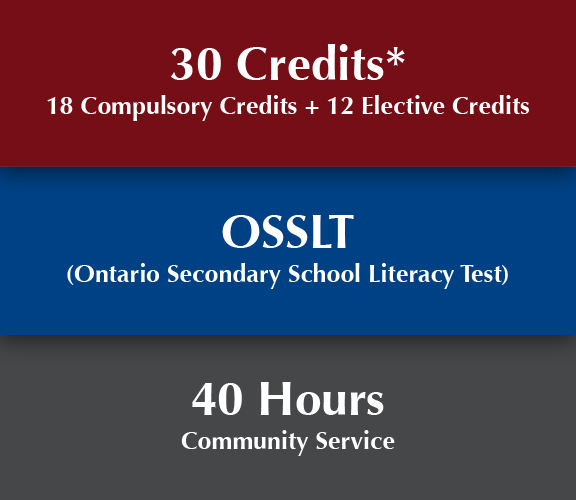1. OSSD Requirements
Students who successfully complete high school are awarded the Ontario Secondary School Diploma (OSSD) from the Ontario Ministry of Education.
In order to earn the OSSD, a student must:
- Earn 17 compulsory credits
- Earn 13 optional credits
- Successfully complete the Ontario Secondary School Literacy Test (OSSLT)
- Complete 40 hours of community involvement activities
* Students who have completed secondary school courses in another country will be offered equivalent credits based on the successful completion of those courses.
* Students who have completed their high school program in their home country may qualify for our Express Program. This program enables students to earn an Ontario Secondary School Diploma within seven months from December to June. Upon graduation, these students can enrol in a university program in September of the same year.

2. Compulsory Credits
What are the 17 compulsory credits needed to graduate?
Students must earn the following compulsory credits in order to obtain the Ontario Secondary School Diploma (OSSD):
- 4 credits in English (1 credit per grade)
- 1 credit in a second language
- 3 credits in mathematics (at least 1 credit in Grade 11 or 12)
- 2 credits in science
- 1 credit in history
- 1 credit in technological education
- 1 credit in geography
- 1 credit in the arts
- 1 credit in health and physical education
- .5 credit in civics
- .5 credit in career studies
Plus:
- 1 additional credit in STEM
Please note: a credit is a means of recognition of the successful completion of a course for which a minimum of 110 hours has been scheduled. A credit is granted to the student by the principal of a secondary school on behalf of the Minister of Education for Ontario. Students who have completed secondary school courses in another country will be offered equivalent credits based on the successful completion of those courses.
3. Optional Credits
In addition to the 18 compulsory credits, students must earn 12 optional credits. Students may earn those credits by successfully completing courses that they have selected from the courses listed in the course calendar. To see the courses listed in the course calendar, click here to open our course calendar PDF..
4. The Ontario Secondary School Literacy Test – OSSLT
As a requirement set out by the Ministry of Education, students must pass The Ontario Secondary School Literacy Test in order to graduate from secondary school. The literacy test is created and assessed by the EQAO (Education Quality and Accountability Office), an arm’s-length agency of the provincial government that evaluates reading, writing and comprehension skills based on the Ontario Curriculum’s expectations in language and communication up to and including Grade 9.
To prepare students for successful completion of the OSSLT, Bronte College holds a Mock Literacy test prior to the OSSLT. Students who do not pass the Mock Literacy Test successfully will receive remedial help to prepare for testing. For more information on the OSSLT, please visit www.eqao.com.
5. Community Involvement
As part of graduation requirements, students must complete a minimum of 40 hours in community involvement activities. The purpose of community involvement is to encourage students to develop awareness and understanding of civic responsibility and of the contributions they can make in supporting and strengthening their communities. These activities may be completed at any time during their years in the secondary school program. International students may bring community service hours with them for partial credit, provided the type of community involvement meets the criteria.
Community involvement may take place in a variety of settings, including businesses, not-for-profit organizations, public sector institutions (including hospitals), and informal settings. Students may not fulfill the requirement through activities that are counted towards a credit (cooperative education and work experience, for example), through paid work, or by assuming duties normally performed by a paid employee.
What Courses Do I Need for University?
University acceptance is based on the average of the top six (6) Grade 12 pre-u courses, including prerequisite courses necessary for specific programs. Below is a chart that outlines both compulsory and suggested electives for Arts, Commerce and Science.
Suggested Electives
| Arts/Humanities/Social Science (B. Arts) | Commerce | Sciences | |
|---|---|---|---|
| Compulsory |
English ENG4U. *some social science programs require Advanced Functions MHF4U and/or Calculus MCV4U |
English ENG4U Advanced Functions MHF4U Calculus MCV4U |
English ENG4U Advanced Functions MHF4U Calculus MCV4U Biology SBI4U Chemistry SCH4U Physics SPH4U |
| Suggested Electives |
History Music Visual Art Philosophy Food and Nutrition Business Leadership Economics |
Accounting Marketing Economics Computer Science International Law Challenge and Change in Society World Politics International Business |
Computer Science Economics World Politics Geography History |
* Please note that this chart is just a general guideline. For specific university program details, research the universities and program(s) you’re interested in.



